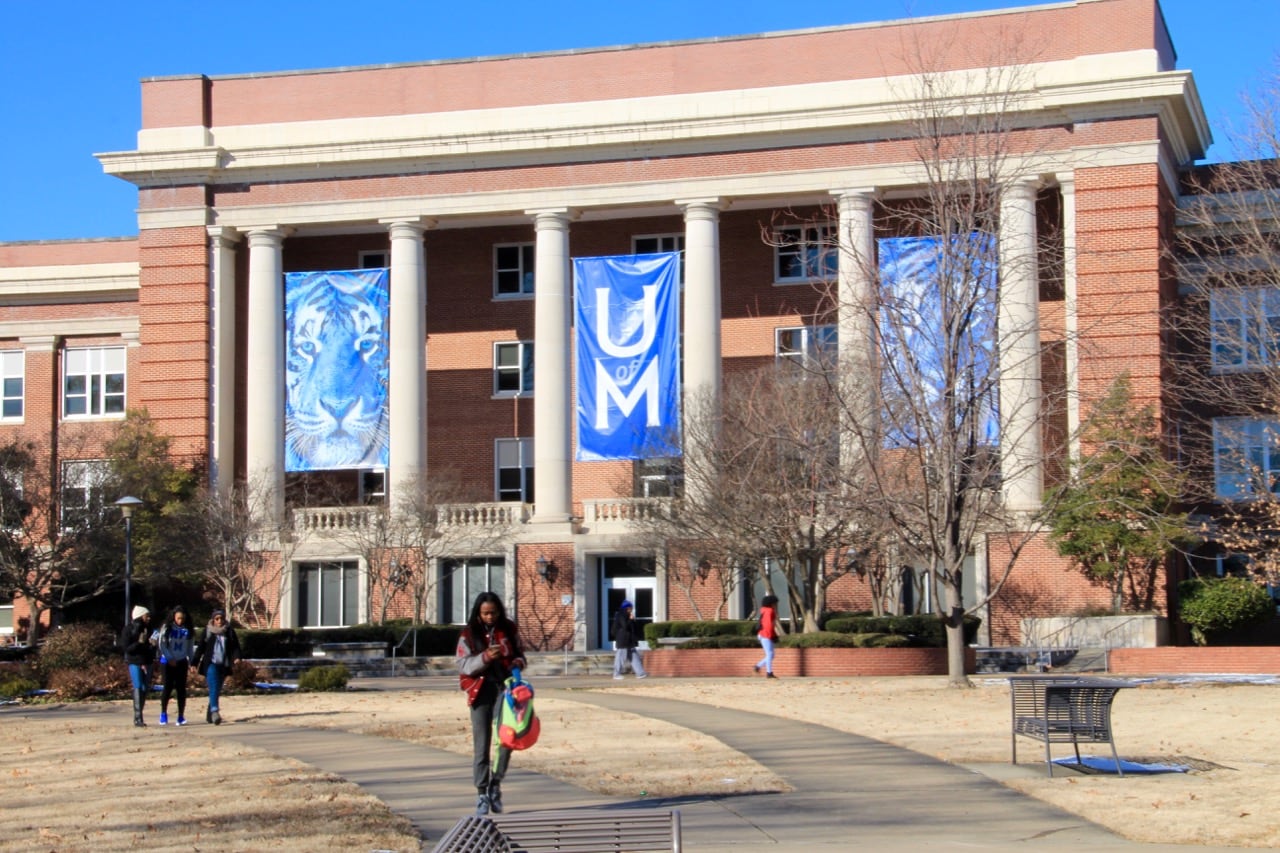Sign up for Chalkbeat Tennessee’s free daily newsletter to keep up with Memphis-Shelby County Schools and statewide education policy.
The University of Memphis, which operates three high-performing schools for K-12 students on its campus, could become its own school district under new legislation from two Republican lawmakers from Memphis.
Rep. Mark White and Sen. Brent Taylor want the elementary, middle, and high schools on the college campus to come under the supervision of a university-led district and shift out of the purview of Memphis-Shelby County Schools, the state’s largest school system.
Under their proposal, the university also could create more schools, including using charter operators, without having to go through MSCS, with which the university has a contractual arrangement. Those new schools could be located throughout Greater Memphis.
White, who plans to introduce the proposal Tuesday in the House K-12 education subcommittee, said he wants to give the university authority to replicate school models that are generating some of the best academic results in Tennessee. While none of the schools have an academic requirement for entry, all three recently received A grades and reward-school designations from the state for student growth.
But a statement Monday from Memphis-Shelby County Schools suggested the district wants to keep its current arrangement.
“We value our longstanding partnership with the University of Memphis and believe Campus School, University Middle School, and University High School are important parts of the district’s educational options,” the statement said. “We look forward to continuing our partnership.”
Proposal envisions a new university-led governance system
The legislation, called the Innovative School District Act, seeks to introduce a new school governance model using public universities to scale up proven innovations in K-12 teaching and learning. The new pathway would remove oversight by traditionally elected school board members who represent the community’s voice in public education. The measure could have statewide implications if other universities pursue the same track.
Under the legislation, Tennessee’s education commissioner could approve a university-based K-12 school system. School governance would be handled by the university’s board of trustees, which also could appoint several of its members as a committee to perform the functions of a school board.
Not just any higher education institution could seek to become a school district, though. The university would be required to have a comprehensive doctoral program and operate a collection of training schools that offer clinical teaching experiences and mentoring for future educators beginning with pre-kindergarten. Such institutions also typically conduct and publish research on effective teaching techniques.
Currently, the University of Memphis, which serves students from pre-K through high school, is the state’s only public university that meets that standard. In addition to its three campus schools, the university partners with Porter-Leath, one of the city’s largest providers of preschool services, to operate an early childhood academy in the city’s Orange Mound neighborhood. Several other Tennessee universities operate training or laboratory schools, but do not serve the full continuum of students from pre-K through graduation.
White, who chairs the House Education Administration Committee, has talked for years with leaders at the University of Memphis about ways to expand its K-12 work. After opening a high school in the fall of 2022, the university warmed to the idea.
“We did not pursue this legislation,” said Sally Parish, the university’s associate vice president for educational initiatives. “Chairman White approached us about scaling our academic model and our academic success to serve more children. We now have a full compendium of pre-K through 12th grade, and the timing feels right.”

Why the shift would matter for MSCS
If the legislation becomes law, the shift to a university-based school system would not be immediately noticeable. While Memphis-Shelby County Schools is their district of record, campus schools already contractually operate under the oversight of the university’s board of trustees. The university has its own policies and procedures, employs all of the schools’ teachers and staff, and provides classroom facilities.
But Memphis-Shelby County Schools, one of Tennessee’s lower-performing districts, would not be able to report the high-achieving campus schools’ scores as part of its own academic data.
Eventually, the university wants to expand beyond its ZIP code.
“One of our challenges is that we have more children on our waitlist than we have in our schools,” said Parish, who oversees the university’s campus schools. “We know there’s a local demand; we just haven’t been allowed to meet it. Our contract with the district caps enrollment at 1,050 students.”
The enrollment cap was part of the contract approved by Memphis’ school board in 2021 to allow the university to open a high school recently on campus to prepare students for college and career. The university’s elementary school opened in 1912 and serves over 400 students. University Middle was founded in 2019 as a project-based STEAM school and serves about 270 students.
School leader sees a chance to diversify enrollment
Campus school programs have faced criticism for not reflecting the diversity of Memphis, where 64% of residents are Black, and nearly a fourth are deemed impoverished. The student population of Memphis-Shelby County Schools is 93% Black and 57% economically disadvantaged.
According to the latest state data, Campus Elementary School’s student population is 24% Black and 7% economically disadvantaged, while students at University Middle School are 48% Black and 10% economically disadvantaged. The state’s demographic data is not yet available for University High School.
Parish believes that with more autonomy and the ability to recruit charter operators to open schools in other parts of the city, the university can diversify its K-12 population and create academic tracks that are more responsive to local workforce needs.
Currently, she said, about 20% of the schools’ students are the children of university faculty and staff; 30% are from families who live within a 2-mile radius of the university; and the rest from the larger Memphis community.
“We’re not shying away from serving a diverse community,” Parish said. “We serve children in every single local ZIP code, but we don’t provide transportation to get to the university, and that’s a barrier that we want to eliminate. Currently, we’re limited in how we can serve students based on what the district allows.”
Having the ability to authorize charter schools would help the university expand to other parts of Greater Memphis, she added.
Tennessee now has 141 traditional school systems operated as city, county, or special school districts. Any of them can authorize a charter school under a 2019 law that created the Tennessee Public Charter School Commission.
The Tennessee Charter School Center, which advocates for charters, is not the driving force behind the new legislation but is consulting with its sponsors.
“What’s most important to TCSC is ensuring that any authorizer in Tennessee is high quality, follows national best practices, and is evaluated by the Tennessee State Board of Education,” said Elizabeth Fiveash, the group’s chief policy officer. “We are working with the sponsors to make sure that is reflected in their proposed language.”
You can track the legislation on the General Assembly’s website.
Marta Aldrich is a senior correspondent and covers the statehouse for Chalkbeat Tennessee. Contact her at maldrich@chalkbeat.org.





